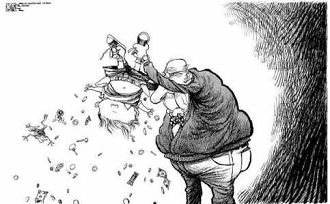 Paying WAY above market rent
Paying WAY above market rent
Buyers of rent to own homes often end up paying rental amounts that are way above fair market.
This is because a seller will say something similar to this:
“Well the rent is $1,300 per month. $1,000 goes toward rent and $300 goes toward purchasing the house.”
This might sound like an ok setup at first, especially if you have trouble saving money for the long-term. But for the seller this is an amazing deal if you agree to it. Because they would be receiving the $1,000 month, which is probably close to what they would get just renting the house. Then they receive $300 extra each month and do not have to pay it back to you if you default on the agreement or decide not to purchase.
In an offer like this it is best to negotiate a payment as close to the $1,000 amount as possible and save the extra money in your bank each month instead.
Because if you don’t end up buying the house, the cash you have been putting away will still be yours!
Agreeing to buy for more then the home is worth
It’s extremely important that you and the seller agree on a purchase price that is close to fair market value. Imagine this scenario:
You find a rent to own home available for $200,000. You sign a rent to own agreement at the price of $200,000. 24 months go by and you are ready to close on the house. But it turns out the home was only worth $180,000 and that is the maximum amount a bank will lend. In this situation you would be short $20,000 to close on the home. Your option fee and any rent credits would help to reduce the purchase price but you would still be short on funds to close on the mortgage when you qualified.
In later videos we will offer advice on how to avoid this mistake. For now, just make sure you verify that the amount you are agreeing to purchase the home for is the current fair market value for the property.
Paying on a home in foreclosure or pre-foreclosure
Imagine being in this situation for a moment: You move in to a rent to own house, pay an option fee of 3%, and make payments for about 6 months.
Then, out of nowhere, you receive a letter in the mail stating the homeowner is over 7 months behind on the mortgage and the home is being foreclosed on!
This is a tough situation to work out. It would be best to bring these concerns up with the seller/Realtor BEFORE signing any paperwork. You could ask them to provide proof from the bank that the mortgage is current.
If the seller won’t provide you with these details you might have uncovered a red flag. Remember, you are taking a risk when entering into a rent to own purchase contract and the seller should understand this and be willing to prove their home is not in default.
Not determining who’s responsible for repairs
This is negotiated upfront BEFORE you move into the rent to own home. In most cases, the tenant is responsible for repairs to the home during the lease period.
But, these are details that you NEED to work out upfront, so make sure you discuss this early on in your conversations before you commit to the agreements. Also be sure to include them in your lease and option agreements.
Avoid a house needing several repairs that the owner wants you to fix. Don’t forget, if you end up not purchasing the house, all of the money you spent on any upgrades to the house will be forfeited to the owner.
Letting the option period expire before you qualify for a mortgage
If the option period expires before you qualify for a mortgage, the seller no longer has an obligation to sell you the rent to own listing.
this mistake when they agree to a lease to own contract without checking how long it will take for them to qualify for a mortgage. If you sign up for a 24 month rent to own option period, but need 36 months before you can qualify for the mortgage you are destined to fail.
Keep this is mind…
You can have your attorney/Realtor put in writing on your paperwork that you have the right to extend your option period before it expires. This must also be discussed and agreed to between you and the seller/Realtor.
Paying WAY too much for the option fee
If the seller wants 5% or more toward the option fee, you may want to consider negotiating this cost, or consider researching other homes.
Don’t be one of those buyers who mistakenly puts up $20,000 for an option fee on a rent to own house only to end up losing it because you can never qualify for a mortgage.
It’s usually more practical to pay a larger fee upfront with owner financing because you are actually buying the home. But with a lease option you want to keep your option fee as low as possible.




I love it when individuals get together and share views. Great website, continue the good work!
Thanks, Vickey!
Thank you!